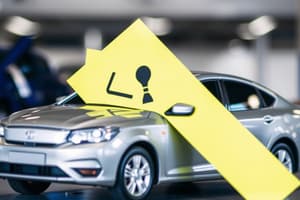Podcast
Questions and Answers
What is the primary purpose of Policy Limits in auto liability insurance?
What is the primary purpose of Policy Limits in auto liability insurance?
- To determine the premium cost
- To exclude certain types of accidents
- To set the maximum amount an insurer will pay for damages or injuries (correct)
- To specify the coverage period
Which of the following is NOT typically excluded from auto liability insurance coverage?
Which of the following is NOT typically excluded from auto liability insurance coverage?
- Criminal activity
- Acts of God (correct)
- Intentional acts
- Contractual liability
What type of insurance coverage provides wage replacement and medical benefits to employees injured on the job?
What type of insurance coverage provides wage replacement and medical benefits to employees injured on the job?
- Workers' compensation insurance (correct)
- Personal injury insurance
- Auto liability insurance
- Employer liability insurance
In which type of insurance coverage do policy limits vary by state?
In which type of insurance coverage do policy limits vary by state?
What is a key difference between Workers' compensation insurance and Auto liability insurance?
What is a key difference between Workers' compensation insurance and Auto liability insurance?
In Workers' compensation insurance, what is typically required for coverage eligibility?
In Workers' compensation insurance, what is typically required for coverage eligibility?
Which state-specific aspect of Workers' compensation insurance is important for employers to comply with?
Which state-specific aspect of Workers' compensation insurance is important for employers to comply with?
What is the primary purpose of Employer Liability coverage?
What is the primary purpose of Employer Liability coverage?
Which type of liability is typically excluded from auto liability insurance coverage?
Which type of liability is typically excluded from auto liability insurance coverage?
In how many states is auto liability insurance not mandatory?
In how many states is auto liability insurance not mandatory?
What type of auto liability insurance system do 12 states follow?
What type of auto liability insurance system do 12 states follow?
Which of the following employees may be excluded from workers compensation coverage?
Which of the following employees may be excluded from workers compensation coverage?
In which states can employees opt-out of workers compensation coverage?
In which states can employees opt-out of workers compensation coverage?
Which of the following states has a state-funded workers compensation insurance program?
Which of the following states has a state-funded workers compensation insurance program?
What determines the minimum number of employees required for workers compensation coverage?
What determines the minimum number of employees required for workers compensation coverage?
Which of the following is a state-specific aspect of workers compensation insurance?
Which of the following is a state-specific aspect of workers compensation insurance?
In which state is workers compensation coverage required for businesses with only one employee?
In which state is workers compensation coverage required for businesses with only one employee?
What is a common requirement for workers compensation coverage eligibility?
What is a common requirement for workers compensation coverage eligibility?
Which of the following states has a unique workers compensation insurance system?
Which of the following states has a unique workers compensation insurance system?
Flashcards are hidden until you start studying
Study Notes
Auto Liability Insurance Coverage
Employer Liability
- Also known as non-owner liability, it provides coverage for the employer when an employee uses a personal vehicle for business purposes
- Covers damages or injuries caused by the employee while driving their personal vehicle on company business
- Typically requires the employee to have a valid driver's license and a personal auto insurance policy
Policy Limits
- The maximum amount an insurer will pay for damages or injuries resulting from an auto accident
- Typically includes:
- Bodily injury liability (per person and per accident)
- Property damage liability (per accident)
- Uninsured/underinsured motorist coverage (per person and per accident)
- Policy limits can vary by state and insurance provider
Coverage Exclusions
- Intentional acts: actions intended to cause harm or damage
- Criminal activity: activities deemed criminal, such as driving under the influence
- Contractual liability: liability assumed under a contract or agreement
- Workers' compensation: injuries or illnesses arising out of and in the course of employment (covered under Workers' Compensation insurance)
Workers' Compensation Insurance Coverage
Coverage Overview
- Provides wage replacement and medical benefits to employees injured on the job or who contract an occupational illness
- Coverage is mandatory in most states, with some exceptions for small businesses or certain types of employees
State Rules
- Workers' compensation laws and regulations vary by state
- Some states have specific rules for:
- Coverage requirements
- Employee eligibility
- Benefit payment structures
- Injury reporting and claims processes
- Employers must comply with the workers' compensation laws in the state where their employees work
Auto Liability Insurance Coverage
Employer Liability
- Covers damages or injuries caused by employees while driving personal vehicles on company business
- Also known as non-owner liability
- Typically requires employees to have a valid driver's license and personal auto insurance policy
Policy Limits
- Maximum amount insurer will pay for damages or injuries from an auto accident
- Typically includes:
- Bodily injury liability (per person and per accident)
- Property damage liability (per accident)
- Uninsured/underinsured motorist coverage (per person and per accident)
- Policy limits vary by state and insurance provider
Coverage Exclusions
- Intentional acts: actions intended to cause harm or damage
- Criminal activity: driving under the influence, etc.
- Contractual liability: liability assumed under a contract or agreement
- Workers' compensation: injuries or illnesses arising out of and in the course of employment
Workers' Compensation Insurance Coverage
Coverage Overview
- Provides wage replacement and medical benefits to employees injured on the job or with occupational illnesses
- Coverage is mandatory in most states, with exceptions for small businesses or certain employees
State Rules
- Workers' compensation laws and regulations vary by state
- States have specific rules for:
- Coverage requirements
- Employee eligibility
- Benefit payment structures
- Injury reporting and claims processes
- Employers must comply with workers' compensation laws in the state where employees work
Auto Liability Insurance Coverage
- Auto liability insurance is mandatory in almost all states, except New Hampshire.
- Minimum coverage requirements vary by state and include:
- Bodily injury liability (per person and per accident)
- Property damage liability
- Uninsured/underinsured motorist coverage
- Personal injury protection (PIP)
- 12 states, including Florida, Michigan, New Jersey, New York, and Pennsylvania, have no-fault insurance laws, where insurance companies pay for damages regardless of fault.
- The remaining states follow a tort system, where fault is determined and the at-fault party is liable for damages.
Workers Compensation Insurance Coverage
- Workers compensation insurance is mandatory in most states, with some exceptions for small businesses or certain types of employees.
- Exclusions from workers compensation coverage vary by state and may include:
- Agricultural workers
- Domestic workers
- Independent contractors
- Elective coverage options are available in some states, allowing employees to opt-out of workers compensation coverage in exchange for alternative benefits.
- Some states, such as Ohio and Wyoming, have state-funded workers compensation insurance programs that compete with private insurance carriers.
- Coverage requirements include:
- Minimum employee threshold, which varies by state (e.g., 1 in Alabama, 5 in California)
- Wage and hour requirements in some states, where employees must work a minimum number of hours or earn a certain minimum wage to be eligible
Studying That Suits You
Use AI to generate personalized quizzes and flashcards to suit your learning preferences.



